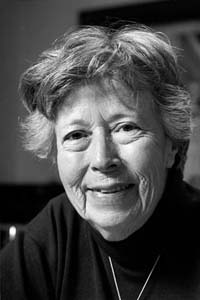Yvette Z'Graggen | |
|---|---|
 | |
| Born | 31 March 1920 |
| Died | 16 April 2012 (aged 92) |
| Occupations | Writer, translator |
Yvette Z'Graggen (31 March 1920 - 16 April 2012) was a Swiss writer and translator. [1] [2]
Yvette Z'Graggen | |
|---|---|
 | |
| Born | 31 March 1920 |
| Died | 16 April 2012 (aged 92) |
| Occupations | Writer, translator |
Yvette Z'Graggen (31 March 1920 - 16 April 2012) was a Swiss writer and translator. [1] [2]
Yvette Z'Graggen was born in Geneva on 31 March 1920 to Alice (née Hekschohann) and Heinrich Z'Graggen. [3] Her father was Swiss German and a dentist and her mother came from Vienna, with Hungarian ancestry. [4] [5] Her paternal grandfather came from the canton of Uri and had moved to Graubünden. [6] Her parents spoke High German when she was young, her mother in memory of Vienna, her father because he preferred it to the Glarus dialect. After they decided to live in Geneva, French was spoken in the family. [7] The family were part of the Protestant Geneva bourgeoisie. [6] At the age of six, she invented the characters Mimi and Noémie, who were allowed to do things that Z'Graggen was not allowed to do. [7]
She earned her high school Maturité in Geneva and then trained as a secretary. She also studied at the University of Florence. [8]
During the Second World War, Z'Graggen worked for the International Red Cross from 1941 to 1946. [9] [10]
In 1939 she wrote her first book, L'Appel du rêve, which was published five years later in 1944 under the pseudonym Danièle Marnan. She wrote novels, autobiographical accounts, short stories and numerous radio plays.
She translated works from Italian and German. Some of her books have been translated into German, Italian, Hungarian and Romanian.
From 1949 to 1952, Z'Graggen she worked as a secretary at the Rencontres Internationales de Genève and at the European Cultural Society in Venice.
From 1952 to 1982, she produced cultural and literary programmes for Radio Suisse Romande. From 1982 to 1989, Z'Graggen worked at the Comédie de Genève theatre when it was under the direction of Benno Besson.
Her 1982 book, Les années silencieuses (The Years of Silence) dealt with the Swiss refugee policy of the war years and the shame of those who had not recognised their shortcomings. [11] In Matthias Berg (1995) and Ciel d'Allemagne (Germany's Sky (1996) she considered the ambivalent feelings her generation harboured towards Germany. [7] [12] In Mémoire d'elles (1999) she used two letters discovered in her late mother's belongings to explore the life of her grandmother. [13]
In 1953, she married Robert Brunel, with whom she had a daughter in 1963. The marriage ended in divorce in 1978. [3]

Yvette Z'Graggen died on 16 April 2012 in Geneva at the age of 92, after a long illness. She was buried in the canton of Geneva.
In 2015–2016, Frédéric Gonseth made a film about Z'Graggen's life, Une femme au volant de sa vie, which was nominated for the Audience Award at the Journées de Soleure 2017 and released in cinemas later that year.

Translations from Italian
Translations from German
Archives littéraires suisses, Fonds: Yvette Z’Graggen. Bibliothèque nationale suisse.Laure Fallet, Marie-Thérèse Lathion. "Fonds Yvette Zgraggen: Inventaire". ead.nb.admin.ch (in French). Archives littéraires suisses.